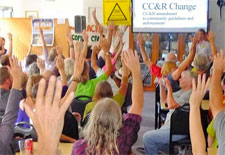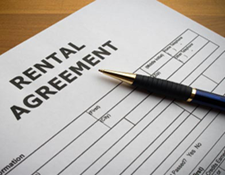*New Case Law
As is a common occurrence for HOA Boards, there is often difficulty in obtaining the HOA members’ consent that is required for taking such actions as amending the HOA’s governing documents or undertaking capital improvements. Failure to obtain the members’ consent–whether it is a result of member apathy or disagreement with the Board’s position–often results in wasted resources that were expended in conducting the election procedures required under California law. HOA Boards are therefore always looking for ways in which they can educate the members on the Board’s position and the reasons why the Board believes that the membership should vote a particular way in the upcoming election.
HOA Boards may therefore seek to utilize media outlets such as the HOA’s website and newsletters, as well as posting notices in HOA common areas, in an effort to garnish member support for the Board’s position. However, when such “advocacy” efforts are made as part of an election campaign, California Civil Code Sections 1363.03(a)(1) and (a)(2) require the HOA to provide equal access to its media outlets and common areas to all members who may be advocating opposing points of view. Where the HOA fails to provide such equal access, Civil Code Section 1363.09(a) allows a court to void the election results and even impose civil penalties.
This was the issue in the recent case of Wittenberg v. Beachwalk Homeowners Association, where the court held that a HOA’s election results could be invalidated based upon the fact that the HOA Board had failed its duty to provide homeowners with the type of equal access contemplated by the Civil Code…
 HOA Lawyer Blog
HOA Lawyer Blog


 *Asked & Answered
*Asked & Answered Under the Davis Stirling Act as currently written, common interest developments (“CIDs”) are required to comply with certain procedures for conducting elections. Among other requirements, the Act requires CIDs run by homeowners associations (“HOAs”) to adopt rules and appoint inspectors for the purpose of verifying signatures, counting and tabulating votes. Additionally, the votes themselves must be placed on secret paper ballots, using a specific procedure requiring the use of double envelopes.
Under the Davis Stirling Act as currently written, common interest developments (“CIDs”) are required to comply with certain procedures for conducting elections. Among other requirements, the Act requires CIDs run by homeowners associations (“HOAs”) to adopt rules and appoint inspectors for the purpose of verifying signatures, counting and tabulating votes. Additionally, the votes themselves must be placed on secret paper ballots, using a specific procedure requiring the use of double envelopes.
 Our
Our  *New Library Article
*New Library Article

 *New Resource
*New Resource